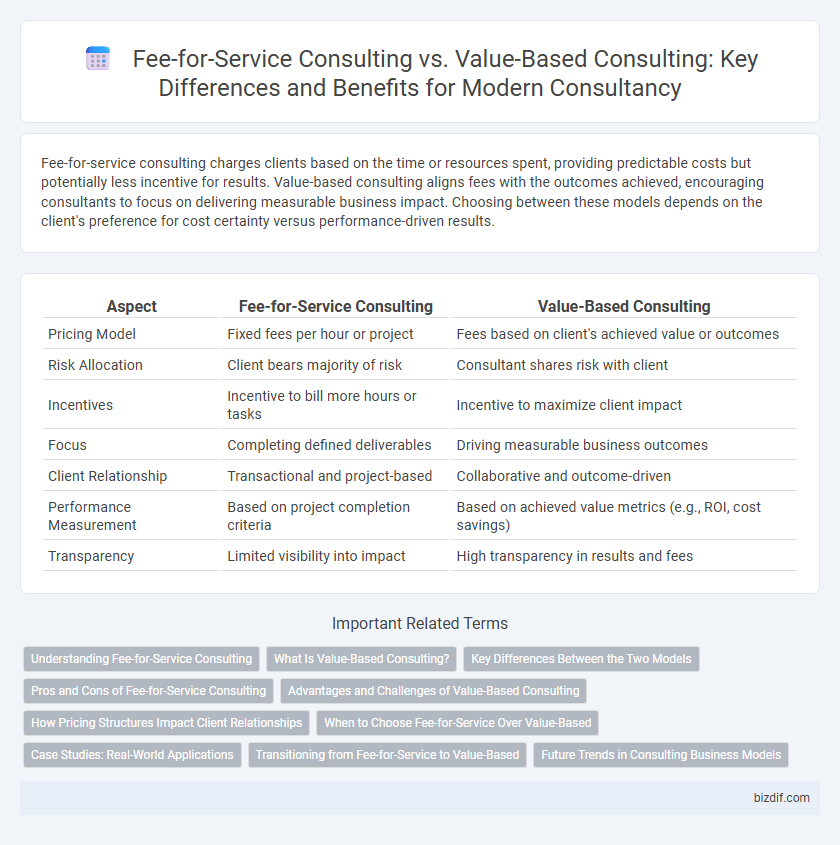Fee-for-service consulting charges clients based on the time or resources spent, providing predictable costs but potentially less incentive for results. Value-based consulting aligns fees with the outcomes achieved, encouraging consultants to focus on delivering measurable business impact. Choosing between these models depends on the client's preference for cost certainty versus performance-driven results.
Table of Comparison
| Aspect | Fee-for-Service Consulting | Value-Based Consulting |
|---|---|---|
| Pricing Model | Fixed fees per hour or project | Fees based on client's achieved value or outcomes |
| Risk Allocation | Client bears majority of risk | Consultant shares risk with client |
| Incentives | Incentive to bill more hours or tasks | Incentive to maximize client impact |
| Focus | Completing defined deliverables | Driving measurable business outcomes |
| Client Relationship | Transactional and project-based | Collaborative and outcome-driven |
| Performance Measurement | Based on project completion criteria | Based on achieved value metrics (e.g., ROI, cost savings) |
| Transparency | Limited visibility into impact | High transparency in results and fees |
Understanding Fee-for-Service Consulting
Fee-for-Service Consulting charges clients based on the specific services delivered, such as hourly rates or project fees, ensuring transparent and predictable billing. This model suits clients seeking clear scope and deliverables without sharing risks or benefits arising from outcomes. Consultants operating under this approach emphasize expertise and task execution, often using detailed contracts to define responsibilities and payment terms.
What Is Value-Based Consulting?
Value-based consulting is a fee structure where consultants charge based on the measurable value or outcomes delivered to the client rather than hourly rates or fixed fees. This approach aligns consultant incentives with client success, focusing on ROI, business impact, and strategic goals. By emphasizing results, value-based consulting drives efficiency, transparency, and stronger client relationships in the consultancy sector.
Key Differences Between the Two Models
Fee-for-Service Consulting charges clients based on the hours worked or specific tasks completed, emphasizing transparency and predictable costs. Value-Based Consulting aligns fees with the outcomes achieved, incentivizing consultants to deliver measurable business improvements and share risks with clients. The key difference lies in payment structure: Fee-for-Service focuses on inputs, while Value-Based prioritizes results and client value.
Pros and Cons of Fee-for-Service Consulting
Fee-for-Service Consulting offers clear pricing and straightforward billing based on hours or deliverables, providing predictability for clients and consultants alike. The model allows consultants to focus on specific tasks without the pressure of outcome-based accountability, which can simplify project management but may reduce incentives for innovation or efficiency improvements. However, this approach can lead to higher costs for clients if projects extend longer than anticipated and may encourage a volume-over-value mindset in service delivery.
Advantages and Challenges of Value-Based Consulting
Value-based consulting offers the advantage of aligning consultant incentives with client outcomes, fostering a partnership focused on measurable results and long-term value creation. This approach can enhance client satisfaction and trust by directly linking fees to achieved goals, but it also presents challenges such as difficulty in defining clear metrics, managing risk for consultants, and the need for robust data tracking systems to evaluate performance accurately. Successful implementation of value-based consulting requires transparent communication, precise goal setting, and adaptive strategies to handle variable project scopes and outcomes.
How Pricing Structures Impact Client Relationships
Fee-for-service consulting establishes clear, transactional billing based on hours worked or deliverables produced, which can lead to straightforward expectations but may limit collaborative innovation between consultant and client. Value-based consulting ties fees to the realized outcomes or business impact, fostering stronger partnerships and aligning incentives for long-term success. Pricing structures significantly affect trust and motivation, influencing how clients perceive fairness and commitment in the consultancy engagement.
When to Choose Fee-for-Service Over Value-Based
Fee-for-service consulting is ideal when project scope and deliverables are clearly defined, allowing precise billing for specific tasks or hours worked. This model benefits clients requiring expert advice on discrete issues with predictable timelines and budgets. Choose fee-for-service consulting when risk sharing is minimal and control over project costs is a priority.
Case Studies: Real-World Applications
Case studies in fee-for-service consulting often highlight clearly defined deliverables and predictable costs, exemplified by projects such as IT system implementation or regulatory compliance audits. Value-based consulting case studies typically demonstrate measurable business impact, including increased revenue or operational efficiency, as seen in strategic growth initiatives or digital transformation programs. Analyzing these real-world applications reveals how fee-for-service suits transactional engagements while value-based models drive long-term client partnerships and shared success metrics.
Transitioning from Fee-for-Service to Value-Based
Transitioning from fee-for-service to value-based consulting requires a strategic overhaul of pricing models to align consultant compensation with client outcomes and long-term value creation. This shift enhances client trust and fosters collaborative problem-solving by prioritizing measurable business impact over hourly billings. Successful transitions depend on transparent communication, robust performance metrics, and the adoption of adaptive frameworks that support continuous improvement and shared risk.
Future Trends in Consulting Business Models
Fee-for-service consulting, characterized by fixed hourly or project-based billing, remains prevalent but faces challenges from clients demanding more outcome-oriented engagements. Value-based consulting, which aligns fees with measurable business results, is gaining traction as organizations seek predictable ROI and risk-sharing partnerships. Future trends highlight a shift towards hybrid models combining transparency, technology-driven analytics, and performance incentives to foster deeper client-consultant collaboration and sustainable growth.
Fee-for-Service Consulting vs Value-Based Consulting Infographic

 bizdif.com
bizdif.com